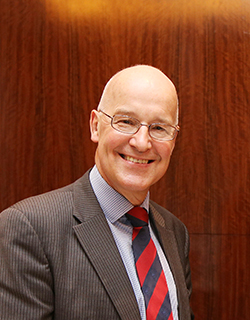Could you briefly introduce yourself to the readers?
My name is Andrew Hamilton, Vice Chancellor of Oxford University, which is the role equivalent to the president of Oxford. I have been the vice chancellor for the past four years and before that, I have spent many years in the United States (U.S.). For most of the time in the U.S., I was at Yale University as a professor of chemistry, and I also took administrative responsibilities, ending my stay as the provost of the university before being recruited to Oxford. I know KAIST very well through a good number of KAIST students who have come and worked with me.

What does the Oxford-KAIST Memorandum of Understanding (MoU) agree upon and what morale does it carry?
It agrees upon a number of things, the first of which is to explore areas of collaborations, future partnership in research, and student exchange. One of the two agreements we have signed today agrees to a very specific program of student exchange, in which each university will encourage students to travel to the other institution to further their studies or research. The MoU carries the moral weight of the respective institutions’ commitment to explore international collaboration as it allows us to improve upon what we are already able to do. Studying abroad brings enormous benefits to education as it allows one to see things through the perspective of a different country.
Do you believe there is a specific character amongst the students who wish to cherish the traditions and yet try to be at the forefront of science?
No, we want a diversity of characters, backgrounds, and ethnic origins. We never look for a specific trait in the students other than a willingness to learn and an ability to learn at the highest level. President Sung-Mo Kang and I were talking about why the U.S., particularly California, has recently been so successful in driving forward industries and in innovation. What is the secret? Although, it is not just one thing, I think an important component is that in the U.S. there is very little fear of failure. In Oxford, we encourage students to be adventurous and to not be scared of getting something wrong. When you get something wrong, you learn much more than you do when you get it right. There is a lot of discussion about the Korean educational system and the very high pressure that students, especially from high schools, are put under, which can come at a cost. Obviously, it comes with benefits, as can be seen from the Olympiad results, but too much emphasis on memorizing facts can come at the price of an unwillingness to make mistakes and the loss of intellectual adventurousness. It is important to recognize that a mistake is not the end of the world and instead, the beginning of something important and new. As Korea considers the many opportunities the educational reforms will bring, I would advise one of those reforms to be encouraging students not to be afraid of making mistakes.
What does Oxford wish to accomplish with KAIST in the long run?
Our goal is to strengthen our the partnership. As discussed, the collaboration allows us to do things not possible alone. The MoU aims to find answers in areas where research partnership will allow us to reach the answers we seek faster.
As an educational institution, what vision and philosophy does Oxford have for its students and what expectations does the university have for its students in return?
Oxford is an interesting place, as it does not have an overarching philosophy other than a commitment to excellence. We expect students to be intellectually adventurous. We do this in a specific way, particularly in the undergraduate level, through a distinctive and powerful form of education called the tutorial system where one or two students spend an hour or two a week with their professor. You may think that it is not much, but during that one hour, students have nowhere to hide. One must be prepared and that preparation is important. Though the hour session is short but tough, the 15 hours of preparation is when you learn the skills of self-study and motivation. This is very much the guiding philosophy of Oxford: for students to think independently and to not take what the professors have said without question, to think critically and independently, and then, to challenge the professor. Challenging perceived wisdom is how knowledge advances and we encourage our students to do just that.
Do you have any last comments or words you wish to say to KAIST students?
I will make one very real comment: think about Oxford. There is often a misplaced perception of Oxford in the minds of many students that somehow Oxford is more of an excellent humanities university than a science and engineering one. However, Oxford is a powerhouse for medical sciences research, engineering research, and mathematics research. We have just recruited Andrew Wiles, a brilliant mathematician, and Oxford’s medical sciences research was ranked best in the world. Students of KAIST, have a look at Oxford. For information about the courses offered and how to apply to Oxford, visit our website at http://www.ox.ac.uk/admissions.

